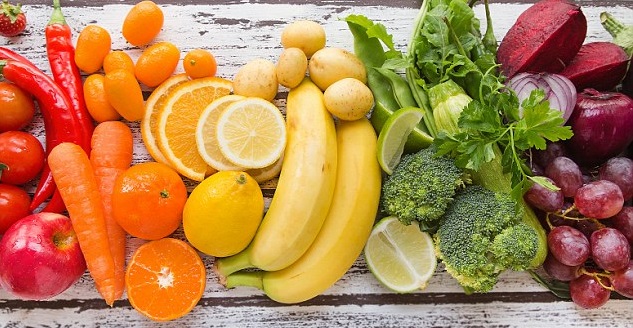Dealing with COVID-19 & its Impact

These are unprecedented times. COVID-19 has officially been declared a pandemic by the World Health Organization. Many countries have closed their borders, populations are in lockdown, cultural, social and sporting events are cancelled.
It can feel as though everything is raging out of control but there are still lots of things you can do to protect your physical and mental health and that of the people around you.
First and foremost, follow our national guidance and updates at www.health.cov.au Avoid spreading the virus and cut your chances of catching it by regularly washing your hands, avoiding touching your face and reducing social contact.
As well as protecting yourself from the virus on the outside, you can also build up your defenses from the inside by strengthening your immune system.
HOW TO KEEP YOUR IMMUNE SYSTEM STRONG
Remember, let food be your medicine. Our immune system relies on nutrient dense whole foods to be able to function well and fight off infection.
Eat Whole Foods
Eat multiple servings of colourful vegetables and fruits that are naturally high in vitamins C and A and antioxidants that support immune function. Aim for 8 or more servings of different vegetables and around 2 servings of fruit per day. One serving equals ½ cup.
Have adequate protein. Try small amounts of protein 3 times a day. Use some organic, clean animal protein along with plant-based proteins such as legumes, nuts, seeds and fermented soy such as tempeh.

Add plenty of garlic, onions, ginger, oregano, turmeric & rosemary to all your meals and snacks as these all offer wide spectrum antimicrobial benefits
Remove acidic foods such as sugar, coffee, alcohol, processed foods, some cheeses and most grains. Viruses thrive in an acidic environment that results from a high intake of these foods. Studies show that refined sugars can suppress your immune system for hours after being ingested.
Have plenty of restorative sleep.
It is during sleep that the body restores and heals so it is virtually impossible to have optimal immune function without adequate sleep. Start putting a routine in place to make sure you are having seven to eight hours of sleep a night. For some hints on healthy sleep see HERE.
Manage stress & develop a healthy mindset – keep a positive outlook.
Reducing exposure to toxins
Practice good hygiene. Wash your hands regularly and carefully – for at least 20 seconds. Practice social distancing when out and about. Avoid contact with people who are sick. Eat well, have adequate rest and practice self-care. For updated and current information visit https://www.health.gov.au/news/health-alerts/novel-coronavirus-2019-ncov-health-alert/
- Particularly Cigarette Smoking. If you are a smoker, make every effort to quit right now! Cigarette smoking increases a certain substance that the corona virus easily hooks onto. So smokers, apart from having less health lungs, are more susceptible to this virus. It gives the virus too many opportunities to be transported into the body and cause havoc. https://www1.racgp.org.au/newsgp/clinical/examining-factors-that-worsen-coronavirus-severity
- Don’t overindulge with alcohol. Binge drinking is bad for your gut flora, and also impairs immune function and increases the severity of respiratory tract infections https://www.ncbi.nlm.nih.gov/pmc/articles/PMC4590612
IMPORTANT IMMUNE SUPPORTING NUTRIENTS
Vitamin C. Small amounts of vitamin C taken regularly e.g. 500-1,000mg every 4 hours is known to support healthy white blood cell production and function and therefore support a healthy immune response. It will also reduce inflammation and improve all tissue integrity. Kiwi fruit are a wonderful food source of vitamin C https://www.ncbi.nlm.nih.gov/pubmed/10543583
Vitamin D. Get yourself out in that sunshine for at least 5-10 minutes of sun exposure every day. And/or take a Vitamin D supplement. A number of studies have shown that taking vitamin D, particularly in people who are vitamin D deficient, reduces the chances of developing acute respiratory infections including influenza. Most studies reviewed used adult doses ranging from 2000IU to 4000IU a day, which is known to be safe to take long term even in the absence of deficiency https://www.ncbi.nlm.nih.gov/pubmed/?term=30675873
Zinc is involved in every enzyme reaction in the body. It is vital for the production and function of white blood cells and a healthy immune response. Pepitas / pumpkin seeds are one of the best food sources of zinc.
Probiotics – support a healthy gut and immune response as the majority of your immune system is in your gut. Consuming probiotic foods regularly or taking a probiotic supplement has been shown to reduce the risk of developing an upper respiratory tract infection https://www.ncbi.nlm.nih.gov/pubmed/?term=25927096
Eat probiotic foods daily such as sauerkraut, kimchi, natto, miso, tempeh, kefir and unsweetened yoghurt (Vaalia has 3 well researched viable strains in therapeutic amounts).
If you prefer, you can take a probiotic supplement. Have a chat to me about the most ideal one for your situation
MORE TIPS
Don’t Forget The Basics! – Wash your hands thoroughly with soap and water whenever you return home from an outing and regularly throughout the day.
Use Heat – Viruses are not able to live at high temperatures. That is why our bodies produce a fever in order to kill off the bugs that are trying to invade us. Hot drinks and things that raise our body temperature can be helpful if fighting of a virus. E.g. turmeric, black pepper, cayenne, garlic, ginger, tea hot water, sauna, steam baths, exercise. A great way to use all of these is in my “Kick A Germ Joy Juice”. Get the recipe HERE. http://www.christinesullivan.com.au/kitchen-pharmacy-kick-a-germ-joy-juice/
Keep moving – Mild to moderate exercise for (30-40 minutes) helps boost the immune system. However, high impact and endurance training will lower immune defenses. Go for walks outside, put on some upbeat & uplifting music and dance.
Keep well hydrated, especially with warmer fluids. Fluids support all our body functions including the immune system. Well hydrated mucous membranes, such as those of the respiratory tract, are more resistant to viral infiltration. Drink herbal teas such as ginger, turmeric and green tea. Drinking and gargling green tea has been shown to reduce the risk of contracting flu. The tannins in green tea have been shown to have broad antiviral effects topically. In one study, residents in an aged care facility gargling the equivalent of ½ cup of green tea three times daily were more than 15 times less likely (OR 15.7) to catch the flu.
If you require more information or help regarding this virus or other health matter, please contact me.
